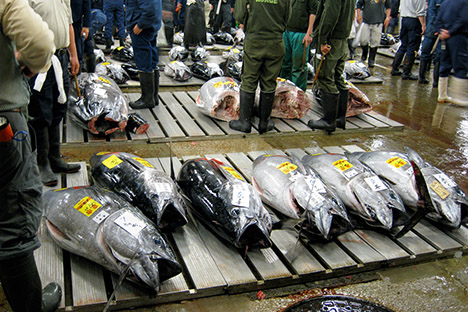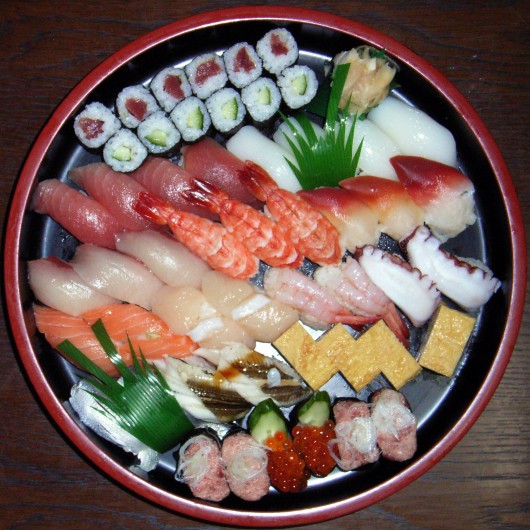Bluefin Tuna – call to boycott Sushi
Saturday, May 4th, 2013 Despite Southern Bluefin Tuna (Thunnus maccoyii) being endangered,
the Australian Government continues its weak policy of appeasing the Japanese – the main poachers and customers of Bluefin Tuna.
Despite Southern Bluefin Tuna (Thunnus maccoyii) being endangered,
the Australian Government continues its weak policy of appeasing the Japanese – the main poachers and customers of Bluefin Tuna.
.
<<The Convention on International Trade in Endangered Species of Wild Fauna and Flora is abbreviated ‘CITES’.
The Australian federal Department of the Environment, Water, Heritage and the Arts. Government is a signatory to CITES and since and CITES international trade regulations have been enforceable under Australian law since 27 October 1976. Every signatory to CITES is required to designate a management authority. In Australia this is effectively the Threatened Species Scientific Committee.
On 7 September 2005, Australia’s Threatened Species Scientific Committee concluded that the Southern Bluefin Tuna (SBT)… “continues to be overfished despite the international management arrangements which have been formally in place since 1994.”
“The parental biomass is currently in the order of 3 to 14% of that in 1960 (its unfished size). In addition, BRS has classified SBT as being ‘overfished’ every year since the first BRS fishery status reports were first produced in 1992.
“Stock assessment models have shown a significant historic decline in the biomass of SBT. The mature population of SBT has declined significantly over its last three generations (since the 1980s) and is currently at a very low level.
Therefore, the species is eligible for listing as endangered under Criterion 1.”
The Threatened Species Scientific Committee recommended this to the Australian Government.
Australia’s then Minister for the Environment and Heritage, Senator the Hon Ian Campbell decided against listing the species under the EPBC Act…“as it may weaken Australia’s ability to influence both the management of the global fishing effort and the global conservation of the species.”>>
[Read More: ^http://www.environment.gov.au/biodiversity/threatened/species/southern-bluefin-tuna.html].
CITES COP15 draft resolution March 2010 on Bluefin Tuna (Thunnus thynnus)
.
* Fishing capacity is at least double that needed to catch the current legal quota and that recent estimated catches have been four times greater than the maximum catch recommended by scientists to prevent the collapse of the population.
* A 78.4% cut would be needed in the fishing effort by the fleet targeting East Atlantic and Mediterranean Atlantic Bluefin Tuna
* East Atlantic and Mediterranean stock status, fell by 80% in the southern Iberian
Peninsula between 2000 and 2006
* The loss of groups of older fish in the shoals present in the Eastern Atlantic and Mediterranean fishery and the drastic fall in the reproductive biomass, which is currently only 36% of the level that existed at the beginning of the 1970s, are clear symptoms that this population is in imminent danger of collapse.
.
CITES has recommended to:
a) Establish a science-based recovery plan for the East Atlantic and Mediterranean stock
… and to ban industrial fishing – particularly purse seining- during the entire spawning season (May, June and July)
b) Establish immediately an interim suspension of the East Atlantic and Mediterranean bluefin tuna fishery
c) Permit resumption of fishing activities only according to the strict science-based ICCAT population-recovery plan
d) Set up protection zones for spawning grounds in the Mediterranean, including the waters within the Balearic Sea, Central Mediterranean, and Levant Sea, during the spawning season.
.
The Japanese, consumers of 80% of the world’s Bluefin, have rejected the ban and the recommendations, while Australia has not accepted the ban. Australia’s federal minister for the environment etc, Peter Garrett, has refused to join the United States and the European Union in seeking a trade ban.>>
.
March 2010: Peter Garrett rejects bluefin trade ban
.
<<Australia has refused to join the United States and the European Union in seeking a trade ban on imperilled northern bluefin tuna, sparking an outcry from conservation groups.
The fish’s plight is seen as a key example of poor global fisheries management, and its fate a potential precedent for Australian tuna fisheries.
The decision by the Environment Protection Minister, Peter Garrett, to go for trade controls instead of the ban has angered the groups, but Australian tuna fishers said it was a sensible outcome.
Listed as critically endangered by the International Union for Conservation of Nature, the northern, or Atlantic, bluefin has lost 72 per cent to 82 per cent of its original stock under pressure from illegal or unregulated fishing for the sashimi trade.
”What’s driving it over the edge is that about 90 per cent of the catch is unregulated export to Japan,” said Glenn Sant, the global marine program manager for TRAFFIC, the wildlife trade network.
Mr Sant said a study he took part in for the UN Food and Agriculture Organisation showed that northern bluefin met the criteria for an appendix one listing under the Convention on International Trade in Endangered Species.
The appendix one listing, supported by the Obama administration and the EU, would prohibit international trade. It is strongly opposed by Japan and would need a two-thirds majority to be approved.
At the CITES meeting starting today in Qatar, Australia will argue for a lesser appendix two listing that provides instead for more tightly managed trade of the fish.
The Australian Marine Conservation Society said the fears of the domestic bluefin industry should not be allowed to dominate government decision-making.>>
[Source: ‘Garrett rejects bluefin trade ban’, 20100313, by Andrew Darby, Fairfax Media, Hobart, ^http://www.smh.com.au/environment/garrett-rejects-bluefin-trade-ban-20100312-q465.html].
CITES failed Bluefin Tuna in 2010
.
<<The triennial meeting of the Convention on International Trade in Endangered Species of Wild Fauna and Flora (CITES) is still underway in Doha, Qatar, this week, but so far news coming out of the conference is a mixed bag. Some trees have been protected, tigers gained a few friends, and a rare salamander got some attention, but all hopes to save the critically endangered bluefin tuna were sunk in a secret ballot that put commerce ahead of science and conservation.
Populations of Atlantic bluefin tuna (Thunnus thynnus) have dropped 97 % since 1960, but the tasty fish remains in high demand in Japan, where sushi bars are willing to pay up to $100,000 or more per fish.
A possible CITES ban on bluefin tuna—supported by the U.S. and 27 European Union nations)—has been in the works for months. Japan, meanwhile, had already announced that it would not comply with such a ban if it were enacted. Unfortunately, the ban failed, and fishing will continue. CITES’s own press release, titled “Governments not ready for trade ban on bluefin tuna,” is surprisingly candid about how this happened:
Japan, Canada and several members States of the Arab league opposed the proposal arguing that regional fisheries management organizations (RFMOs) as ICCAT [the International Commission for the Conservation of Atlantic Tunas] were best placed to tackle the decline of bluefin tuna stocks.
They added that an Appendix I listing [which would ban trade in the species] would not stop the fishing of the species. After a passionate but relatively short debate, the representative of Libya requested to close the deliberations and go for a vote. Iceland called for a secret ballot. The amendment introduced by the European Union and Monaco’s proposal were defeated (20 votes in favor, 68 against, 30 abstentions) in the middle of much confusion about the voting procedures and mixed feelings of satisfaction and frustration from participants.”
Obviously, pro-tuna groups were not happy about this series of events. “It is scandalous that governments did not even get the chance to engage in meaningful debate about the international trade ban proposal for Atlantic bluefin tuna,” said Sergi Tudela, head of fisheries for the WWF Mediterranean Programme Office, in a prepared statement.
Oceana, a conservation group devoted to the health of the oceans, called this “a clear win by short-term economic interest over the long-term health of the ocean and the rebuilding of Atlantic bluefin tuna populations.” And Greenpeace International oceans campaigner Oliver Knowles stated, “The abject failure of governments here at CITES to protect Atlantic bluefin tuna spells disaster for its future and sets the species on a pathway to extinction.”
We’ll be covering more CITES decisions—both good and bad—all week.>>
.
[Source: ‘Sushi-cide: Secret ballot kills hopes for bluefin tuna protections’, by John R. Platt, 20100323, ^http://blogs.scientificamerican.com/extinction-countdown/2010/03/23/sushi-cide-secret-ballot-kills-hopes-for-bluefin-tuna-protections/].
Call to Boycott Japanese Cuisine
.
Japanese cuisine includes sashimi, which typically is Bluefin Tuna. Bluefin is the raw fish used in Japanese ‘maguro’, and ‘o-toro’ dishes and in many sushi combinations.
The Australian Government may pasty to the Japanese, but that doesn’t stop ethically driven citizens boycotting Japanese restaurants and sushi shops, which sell raw fish which is typically the critically endangered Bluefin Tuna.
It’s time to send a blunt message to the Japanese that their fettish for Bluefin is backward! Some are labelling the plight of ‘BLUEFIN SUSHICIDE‘.
.
 Japanese eating the Endangered into Extinction
Japanese eating the Endangered into Extinction







